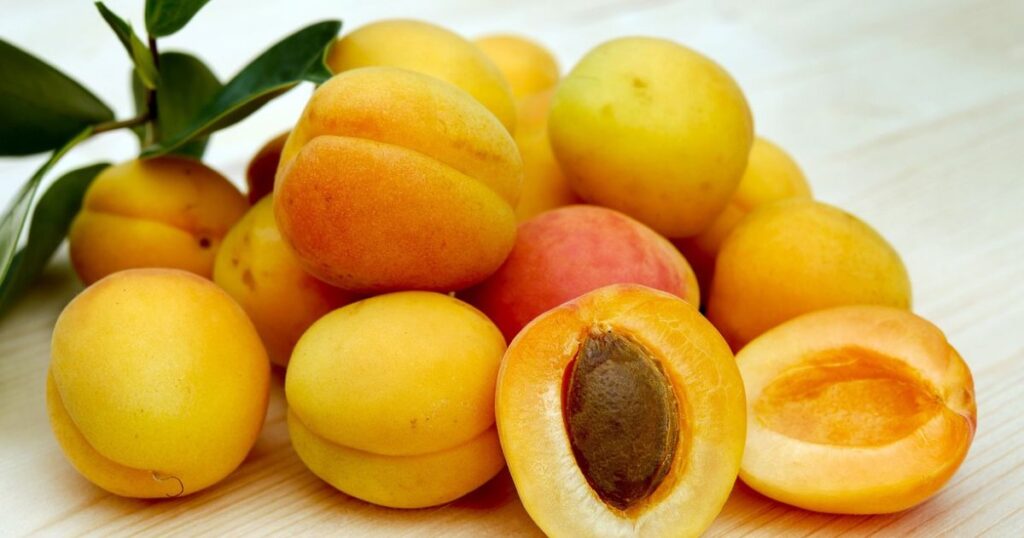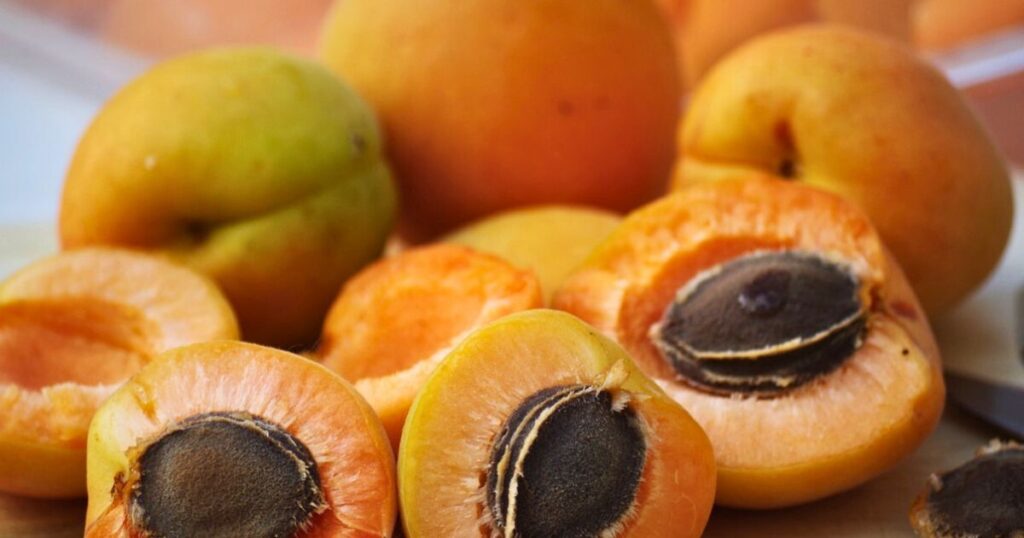
Apricot is a fruit that belongs to the Prunus family and is known scientifically as Prunus armeniaca. They are famous for their delightful taste. They offer a unique combination of sweetness and tartness that many people find appealing.
Apricots can be enjoyed fresh, dried, or used in a wide range of dishes, including desserts, jams, jellies, sauces, and baked goods.
But can hamsters eat them?
In short, yes, hamsters can eat apricot. They are packed with essential vitamins, such as vitamins A, C, and E, as well as dietary fiber; however, since they are high in natural sugar, you should offer only a small piece of apricot occasionally.
Now let’s find out whether you should feed this delicious fruit to your hamsters or not, potential benefits, risks, and some alternatives as well.
Table of Contents
Can Hamsters Eat Apricots?
Yes, hamsters can eat apricots in moderation. Apricots are safe for hamsters and can be a healthy addition to their diet. However, it’s important to note that apricots are high in sugar, so they should be given as an occasional treat.
Too much sugar can lead to health issues in hamsters, such as obesity and dental problems.
When feeding apricots to hamsters, it’s best to offer them fresh apricots instead of dried ones. Fresh apricots retain more water and provide hydration along with nutrients.
Wash the apricot thoroughly and remove the pit or seed before offering it to your hamster. Cutting the apricot into small, bite-sized pieces is also recommended to make it easier for the hamster to eat.
Is Apricots Safe for Hamsters?
Yes, apricots can be safe for hamsters when fed in moderation and prepared properly. Apricots are a nutritious fruit that can provide various health benefits to hamsters, thanks to their rich content of vitamins, minerals, fiber, and antioxidants.
However, too much apricot can harm your hamsters due to high sugar content. Also, some hamsters may have sensitivities or allergies to certain foods, so it’s important to watch for signs of discomfort, such as diarrhea or changes in behavior.

Also, it’s crucial to wash the fruit thoroughly to remove dirt or any pesticides. Remove the pit and slice the apricot into small, manageable pieces. Avoid adding any sweeteners, salt, or spices that could be harmful to your hamster’s health.
How Many Apricots Can I Feed My Hamster?
When it comes to feeding apricots to your hamster, moderation is key. While apricots can provide nutritional benefits, they should be given in small quantities to avoid potential health issues.
As a general guideline, you can offer your hamster a small slice or a couple of tiny pieces of apricot as an occasional treat. Remember that apricots contain natural sugars, so excessive consumption can lead to weight gain and other health problems for your hamster.
Observing your hamster’s reaction after introducing apricots into their diet is important. Monitor for any signs of discomfort, digestive issues, or changes in behavior. If you notice any adverse effects, it’s best to discontinue feeding apricots and consult a veterinarian if necessary.
Can Dwarf Hamsters Eat Apricots?
Yes, dwarf hamsters can eat apricots in moderation. Apricots can provide nutritional benefits to dwarf hamsters, just like other hamster breeds. However, it’s important to introduce new foods gradually and monitor your dwarf hamster’s reaction.
Remember that apricots contain natural sugars, so excessive consumption can lead to weight gain and other health problems for your dwarf hamster. Treat apricots as an occasional snack and ensure that the main diet of your dwarf hamster consists of high-quality hamster pellets, fresh vegetables, and access to clean water.
Benefits of Feeding Apricots to Hamsters
Feeding apricots to hamsters can offer several benefits to their health and well-being. Here are some of the benefits of incorporating apricots into your hamster’s diet:
A serving of apricots (approx 100g) contains:
- Water: around 86 grams of water
- Calories: around 48 calories
- Fiber: approximately 2 grams of fiber
- Carbohydrates: about 11 grams of carbohydrates
- Vitamins and Minerals: Apricots are a good source of vitamins and minerals contributing to your hamster’s health. They provide vitamin A, vitamin C, potassium, and other beneficial nutrients.
Other health benefits of apricot may include:
Nutritional Value: Apricots are a rich source of essential nutrients that can contribute to your hamster’s overall health. They contain vitamins A and C, which are important for immune function and overall well-being. Apricots also provide dietary fiber that supports a healthy digestive system.
Immune System Support: The vitamins and antioxidants present in apricots can help boost your hamster’s immune system. A strong immune system can help protect your hamster from various illnesses and infections, promoting their overall health and vitality.
Digestive Health: Apricots are a good source of dietary fiber, which aids digestion and helps prevent constipation. Including apricots in your hamster’s diet can contribute to a healthy digestive system and reduce the risk of digestive issues.
Antioxidants: Apricots contain antioxidants that help neutralize harmful free radicals in the body. These antioxidants can contribute to your hamster’s overall well-being and may have potential long-term health benefits.
It’s important to remember that apricots should be given to hamsters in moderation, as excessive consumption can lead to weight gain and other health issues.
Potential Risks to Consider
While apricots can provide health benefits to hamsters, it’s important to be aware of the potential risks associated with feeding them to your furry friend.
Here are some risks to consider:
High Sugar Content:
Apricots contain natural sugars, and excessive consumption can lead to weight gain and potential health issues such as diabetes. It’s crucial to offer apricots in moderation and consider the overall sugar content of your hamster’s diet.
Allergies or Sensitivities:
Just like humans, hamsters can have individual allergies or sensitivities to certain foods. While apricots are generally safe, some hamsters may show adverse reactions, such as digestive upset or allergic responses.
In this case, you should stop feeding this fruit.
Choking Hazard:
The pit or seed inside the apricot is a choking hazard for hamsters. Always ensure that you remove the pit completely before offering apricots to your hamster. The pit should never be given to hamsters as it can cause intestinal blockages or other serious health issues.
Pesticide:
Make sure you wash the apricots thoroughly before offering them to your hamster. Apricots may have been treated with pesticides or other chemicals during cultivation. Washing them helps minimize the risk of pesticide ingestion.
You can also opt for organic apricots if available; it can reduce exposure to harmful chemicals.
Digestive Upset:
Apricots can potentially cause digestive upset in some hamsters. Sudden dietary changes can disrupt their digestive system, leading to diarrhea or stomach discomfort. So, if you see any digestive or other behavioral changes in your hamsters, it’s recommended to consult a vet.
Can Hamsters Eat Apricot Pits or Seeds?
No, hamsters should not eat apricot pits or seeds. Apricot pits contain cyanide compounds, which can be toxic to hamsters and pose a significant health risk.
Also, the pits or seeds can choke your hamsters if they try to swallow them. So, it’s better to remove the pit or seed completely before offering apricots to your hamster.
The pit should be discarded safely and kept out of your hamster’s reach. Avoid giving your hamster access to apricot pits in any form, whether whole or cracked open.
Feeding apricot pits to hamsters can result in severe poisoning and potentially be fatal. Thus, stick to offering the ripe flesh of the apricot as a treat to your hamster, and ensure it is properly prepared and offered in moderation.
If you have any concerns or suspect that your hamster may have ingested apricot pits, contact a veterinarian immediately for guidance.
Are Dried Apricots Safe for Hamsters?
Dried apricots can be offered to hamsters but with caution. Firstly, drying apricots are more concentrated, meaning they have more sugar.
Excessive sugar intake can lead to weight gain, dental problems, and other health issues for hamsters. Therefore, dried apricots should be given sparingly and in small quantities.
Also, dried apricots can be tough and chewy, which may pose a choking hazard or difficulty in digestion for some hamsters.
Some dried apricots may be treated with sulfur dioxide as a preservative, which can cause adverse reactions in sensitive hamsters. It’s best to opt for unsulfured or organic dried apricots to minimize the risk of potential health issues associated with sulfur dioxide.
So, if you want to feed your hamsters apricots, opt for fresh than dried ones, as they are safer and healthier for your pet.
How To Feed Apricots to Hamsters
When feeding apricots to your hamster, it’s important to properly prepare them to ensure your hamster’s safety and enjoyment.
Here are steps to follow when preparing apricots for your hamster:
- Choose Fresh and Ripe Apricots: Select fresh apricots that are ripe and free from any signs of mold, bruises, or rot. Ripe apricots are softer and easier for your hamster to chew and digest.
- Wash Thoroughly: Before offering apricots to your hamster, rinse them under cool water to remove any dirt, debris, or even pesticide, if it has any. This step is crucial; never skip it.
- Remove the Pit: Apricot pits are toxic to hamsters and should be removed completely. Cut the apricot in half and gently twist or scoop out the pit with a spoon. Ensure no traces of the pit remain, as it poses a choking hazard and can be harmful if ingested.
- Cut into Small Pieces: After removing the pit, slice the apricot into small, bite-sized pieces. This helps your hamster manage the fruit easily and reduces the risk of choking.
Apricot Alternative for Hamsters
If your hamster doesn’t like the taste of apricot, don’t worry. Some several other fruits and vegetables can be safely offered.
Here are some options that you can consider:
- Apples: Apples are a popular and safe fruit for hamsters. Remove the seeds and core, then slice the apple into small, manageable pieces before offering it to your hamster.
- Carrots: Carrots are a crunchy and nutritious vegetable that hamsters enjoy. Wash and peel a carrot, then cut it into thin slices or small sticks for your hamster to nibble on.
- Berries: Hamsters can enjoy berries such as strawberries, blueberries, and raspberries. These fruits are rich in antioxidants and provide a sweet and refreshing treat. Offer them in moderation due to their sugar content.
- Peas: Fresh or frozen peas can be offered to hamsters as a source of fiber and vitamins. Thaw frozen peas or steam fresh ones to soften them before serving.
- Cucumber: Cucumber is hydrating and low in calories, making it a great option for hamsters. Cut the cucumber into small slices or cubes for your hamster to enjoy.
- Pears: Pears are a tasty fruit that can be given to hamsters occasionally. Remove the seeds and slice the pear into small pieces before offering it to your furry friend.
Final Thoughts
To sum up, apricots can be a tasty and nutritious addition to your hamster’s diet. They offer various vitamins, minerals, and antioxidants that can support your hamster’s overall health. However, it’s essential to consider the potential risks associated with apricots, such as their sugar content and needing to remove the pits.
When offering apricots to your hamster, remember to wash them thoroughly, remove the pit altogether, and cut them into small pieces. This helps ensure your hamster’s safety and makes it easier for them to enjoy the fruit.
Also, watch your hamsters for any adverse reactions or digestive issues after feeding apricot. If everything is fine, you can offer your hamster’s apricot as a treat.
Do not overfeed.
While apricot can be a healthy treat, focus on maintaining a healthy and balanced diet for your hamsters. Usually, it should consist of commercial pellets, fresh veggies, and a small number of fruits
Before you go, here are some other useful articles:
